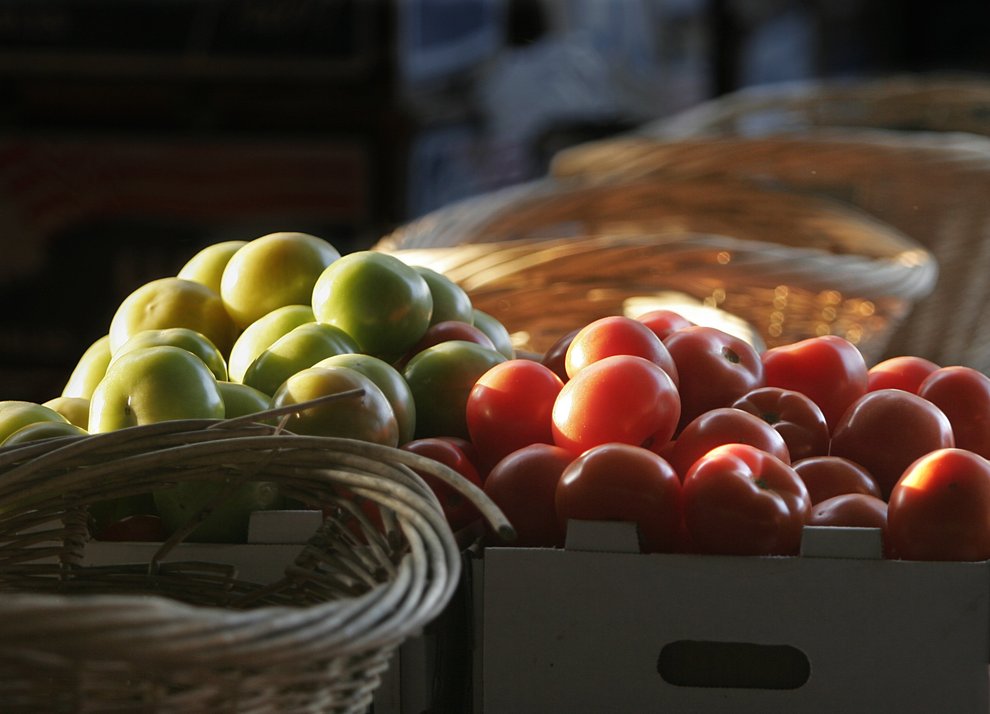
By the historical Water Tower in downtown Fresno, four colorful food trucks lined up along with two netted food booths to sell fresh gourmet food, from fruit cobbler to tamales. Unlike Los Angeles or San Francisco, Fresno isn’t known as a foodie haven, but that may be changing. Hundreds of people flock to the Friday food truck event, called CArt Hop because art is on display too. And that’s just one way that a new generation of food trucks are emphasizing fresh, local and health foods in the Central Valley city.
A nonprofit organization, Creative Fresno, is in charge of CArt Hop, which started last year with a focus on using food local to the San Joaquin Valley. The project coordinator, H. Steele, says that among the criteria for all food vendors at the event is to use locally grown ingredients and innovativeness.
Dustin Stewart, co-owner and chef of Dusty Buns Bistro, thought up the idea – a Central Valley version of Matt Cohen’s Off the Grid in San Francisco.
“There is a capacity to have just as many types or ethnicities of food trucks as any other city because of what the Valley grows and produces locally,” Stewart said.
Launched in 2010, Dusty Buns Bistro earned a reputation as Fresno’s first gourmet food truck, serving and advocating for dishes made from scratch with fresh, organic products. Their business won the tenth place in a national food truck contest in 2011. Today, they also have a restaurant downtown.
The Stewarts are known regulars of farmers’ markets, including the Vineyard Farmers Market in Fresno. Local sources of their ingredients include Green Jeans Ranch, which raises free-range chickens, and Marian Farms, a Community Supported Agriculture Biodynamic farm and distillery with practices such as composting, soils restoration via cover or seasonal cropping, and seed saving. The Dusty Buns website lists several other local organic farms from where their food is derived.
Community Supported Agriculture is a movement that has become popular throughout California and had gained a following in the San Joaquin Valley over the last decade.
When locals turn to of Community Supported Agriculture, people grow better relationships with food producers and widen the variety of their diets, said Tom Willey, owner of T&D Willey Farms in Madera, which began in the 1980s.
In this system, members subscribe for boxes of produce to be delivered to them at fixed monthly or yearly price rates. So far, T&D Willey Farms has more than 800 members. The CSA also helps to support the farm’s 62 employees and their families.
According to Dr. Sajeemas Pasakdee, the adviser of California State University Fresno’s Student Operated Organic Farm, eating local and organic is beneficial to community health. Not only are health and environmental risks reduced due to the avoidance of pesticides, for instance, but it also provides awareness to consumers about the origins of their food and a sense of unity.
The university’s organic farm used to supply goods to the university dining services, which now has an extension, a kitchen-on-wheels called Bulldog Bites.
“We are the second campus in the CSU to have branded its own mobile food truck,” said Megan Sarantos, the food truck’s manager.
Healthy food may be a growing trend, but all mobile vendors aren’t on board with the change yet – and neither are all consumers. For example, healthy choices are on the Bulldog Bites menu, but are often not as popular as the others, Sarantos said.
Genoveva Islas-Hooker, Regional Program Director of the Central California Regional Obesity Prevention Program, still lauds the efforts of CArt Hop, particularly in their use of local produce and support of local enterprise.
Yet Islas-Hooker also hopes for more healthy food at affordable prices and increased food access in “areas with limited food options.”
A solution, in the form of a mobile teaching kitchen, may arrive soon. Clarene White, a personal chef, entrepreneur, and certified instructor, is the organizer of this new venture called Cook’n Up Mobile Teaching Kitchen and Theater, part of her Food for Your Soul Ministries. One of the main services of this social enterprise would be not only to sell nutritious food but also to teach others about healthy cooking and eating within a small budget. In this way, White aims to join the fight against issues such as diabetes and hunger. For this cause, she has recently partnered with the Central California Regional Obesity Prevention Program.
She is excited about another feature of the kitchen too: a teppanyaki grill, often found at Japanese restaurants. Diverse meals would be created with fresh, local ingredients. The mobile kitchen route would include Central and South Fresno, which, she says is abundant in fast food, but limited in access to fresh products.
Among her target population are seniors, veterans, children and the homeless.
Innovation has played a major role in the growing popularity of food trucks and the eat-local trend. James Caples, the Benaddiction food truck owner at CArt Hop, accepts text messages for orders, and his menu items boast musically inspired names, such as the Clapton and Mr. Jones sandwiches. Dusty Buns Bistro makes lunch box deliveries to offices. White plans to add an entertainment component to her social enterprise.
A common goal for local food entrepreneurs is the exposure to more opportunities for themselves and others, from the food producers to the food truck customers. This may mean creating an environment friendly to health, economic sustainability, and collaboration.
“Food trucks may be in our future as a staple in the Central Valley, to represent our wealth and harvest,” Stewart said.





